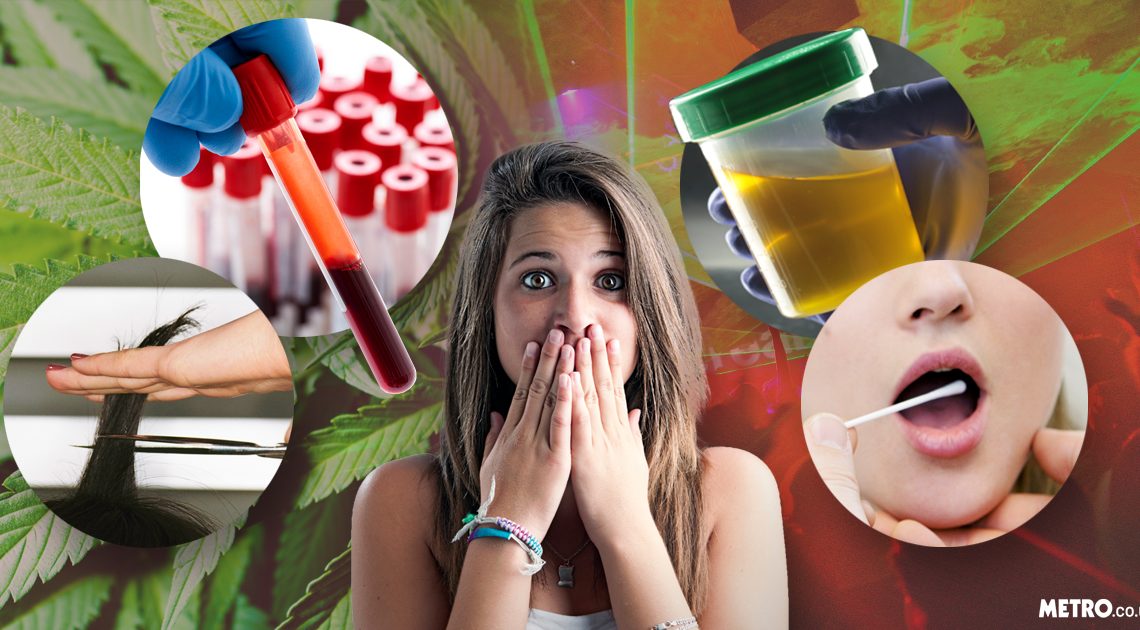
What Happens if You Refuse to Take a Drug Test for Work?
July 23, 2018Earlier this summer Oklahoma became the 30th state to legalize medical marijuana. That decision followed nine other states, plus Washington D.C., legalizing recreational use of marijuana for any reason. Considering the increasing liberalization of laws regarding use of the drug, and a marked trend in the number of Americans who say it should be legal—64-percent according to a Gallop poll—it’s easy to get the impression that it’s open season on smoking up, or at least soon will be, everywhere. There’s just one snag there: Despite widespread opinion to the contrary, and regardless of whether or not you are now free to walk down the street in your specific state in a cloud of smoke, you can still get fired, or passed over in the hiring process, if it’s found in your system after a drug test.
Numbers vary on exactly how common it is, but the best estimates from over the past few years range between 40-percent and 57-percent of U.S. workers being drug tested. What’s worse, that’s despite a lack of serious evidence that such tests actually lead to a safer work place in the first place. The practice, like a lot of reefer madness policy, can be traced back to Reagan-era drug panic, after a handful of high profile transportation accidents led to the government mandating testing for federal employees or any company that received significant government contracts. In short, someone fucked up decades ago, and now we’re all suspects. You might say "Only in America" as a joke here, but it pretty much is only in America that this sort of widespread testing happens.
Confounding all of the progress in the liberalization of marijuana laws is that the drug is still, somehow, illegal under federal law, where it’s currently classified as a schedule one substance. That’s a purposefully reactionary opinion that essentially ignores all of the medical benefits we are coming to learn about, not to mention the intuitive differences between weed and other schedule one drugs like heroin and meth that reasonable people everywhere have long understood. Until that disconnect is squared, like it or not, the reality is you still may want to keep an eye on your use if you’re applying for a job, or even if you’re already holding one down. We asked three experts on marijuana policy and/or labor law to explain a little more about where things stand when it comes to testing.
How common is drug testing exactly?
“It’s almost an automatic in a lot of blue collar work, but it’s extended into the service industry for a variety of different reasons,” said Stefan Borst-Censullo, a criminal defense attorney who also works on licensing policy for the cannabis industry in California. “Generally speaking, below a certain income level it should just be expected if you're applying for a job, even more so in a temp agency.”
“It’s pervasive in the U.S.,” said Dale Gieringer of California NORML. “And there is talk about it in Canada now, where manufacturers up there are talking about extending it. Canada has sort of had rules that preclude that kind of stuff for a while, but now that they’re legalizing there’s pressure from businesses to do something.” On the other hand, Gieringer points out, there have been quite a few press reports since Colorado and California legalized about companies that are abandoning at least testing for marijuana voluntarily.
So it’s completely legal to compel an employee to do a drug test?
It’s not illegal to test because it’s still a federal crime to use marijuana. “You're committing a federal crime if you're using it,” Gieringer said.
“Drug testing is not illegal at all,” added Amy Gluck, a lawyer in New York who writes on employment and drug policy and advises corporate clients on human resources issues related to testing among other things. The only way an employer could run afoul of the law when it comes to testing is if the tests are not applied evenly, meaning an employer cannot target certain protected classes of people, race, religion and so on, when deciding who to test.
The Supreme Court, in 1989, acknowledged that while it may be an invasion of citizens’ privacy, testing can be necessary in ensuring the health and safety of others.
What if it’s for medical use?
It will depend, according to all three experts, but courts have ruled in favor of employers when it comes to firing workers for marijuana use, even if it’s for a medically valid reason in states where marijuana is legal. In 2015 the Colorado Supreme Court upheld a lower court’s ruling in a case in which a Dish Network employee, Brandon Coats, a quadriplegic who used medical marijuana when off duty to control seizures, was fired for a positive drug test. On the other hand, the Massachusetts Supreme Court came to the opposite conclusion in a similar case last year.
Is it the states we think are more liberal that have better protections?
“New York is certainly very liberal, and has some of the most employee friendly policies in the country,” Gluck said. However, a bill introduced in California to ensure the rights of medical marijuana users stalled in committee this year and won’t be looked at again until next year. Twelve states have certain protections for medical cannabis patients’ in the workplace, eleven through statutes, and one, Massachusetts, judicially established.
“If you're using it outside of work and it doesn't effect your performance they may have to accommodate you,” said Gluck, although noting that the Americans with Disabilities Act does not say employers need to provide a reasonable accommodation.
Does an employer need reasonable suspicion to test you?
Again, it depends, said Gluck, on a state by state basis and on the type of job. “Some states require reasonable suspicion, but with a safety sensitive position that’s a huge issue. They don’t need reasonable suspicion to test, and they don’t need to accommodate medical marijuana use.”
“When somebody says an employer discriminated against them, say, based on a medical disability, it’s their burden of proof,” Gluck said. “That’s how it always ends up. The employer has to come back and say, ‘No there’s a legitimate non-discriminatory reason why I did what I did. And that can be we have federal contracts, or this is a safety sensitive position. This guy runs the airport, for example, that’s a safety sensitive position.’”
Can you refuse the test?
Yes, according to Gluck, but you probably won’t get the job you’re applying for or may be fired from the one you have. While some states have limits on when tests can be administered—like California, where it can only happen after a job offer has been sent out on the condition of passing the test. In other states employers have to provide written notice to applicants or list it in a job posting that a test will be required.
Is it worse for people in blue collar fields?
“Yeah, and there’s a legitimate issue, for jobs where people are more likely to be hurt on the job,” said Borst-Censullo. “But at the same time I think you have to read in a class thing as well. Most people who are applying for a desk job would be offended outright if they're being asked to pee in a cup. People who are working in more physically demanding and less compensated jobs are kind of used to the abuse, frankly.”
What often happens, particularly in jobs where there is a lot of physical activity required, or, to be less charitable to employers, as Borst-Censullo put it, where you might be entitled to workers compensation if you do get hurt, employers will screen you before hiring, then refer to drug test results after an on the job accident to see if they can use that evidence against you in any liability claims.
Where is labor in all of this?
“While attitudes about drug use in general are liberalizing labor rights are not,” said Borst-Censullo, referencing the Colorado case, which had a chilling effect on policy advocates.
“Mostly, labor caved in to a large extent during the 80s and 90s, and a lot of unions were willing to trade drug testing for higher wages or something like that,” said Gieringer. “But at the moment, on a bill we are working on here in California we had labor support from United Food and Commercial Workers and a couple other unions, but what’s stalled us is opposition from some construction trade organization which feel they need to have testing.”
What about cannabis activists?
In efforts to decriminalize around the country, advocates will avoid going anywhere near questioning the legitimate needs of an employer to ensure a safe work environment, justified or not, because it’s “political poison” said Borst-Censullo. “At the moment, at least in California, and on the Atlantic where legal states are starting to sprout up, people are more interested in setting up businesses so capitalists can make money. The rights of the consumer aren’t a concern at the moment."
What happens once you fail a test?
“There’s really no consistency that I can discern,” said Gieringer. Sometimes you might have to enter a drug program of some sort, or sometimes they’ll suspend you for a while. “A lot of times they fire you outright, but a lot of that depends on the terms of the labor contract.”
Should we be angrier about this?
"As a management side attorney, I think employers have the right to insist on a safe workplace, said Gluck. "But I think zero-tolerance policies such as those that do not consider underlying disabilities, which may be successfully treated with medical marijuana, do not support the employer’s interests. I do not see the point to drug testing that lacks a legitimate nexus to job tasks; drug testing should be rationally related to the position."
Borst-Censullo: “I think somebody’s private activity off the job site is irrelevant, and I think drug testing is a lazy way to determining liability, as it is with DUIs, especially since marijuana is present in your system even after it’s psychoactive. Instead of an over-reliance on technology I’d rather employers be able to demonstrate that an employee who got hurt on the job took certain actions that lead to that instead of saying ‘He’s a drug user and so he has no credibility.’"
"Drug testing has far exceeded its narrow pragmatic use for appropriately assessing liability in industrial accidents and is now being used to control people in the criminal justice system, the workplace, and even the social welfare system," he continued.
“It just amazes me how in America, the ‘land of the free’, Americans are so willing to stand up for their right to own guns but not to control their own bodies,” Gieringer said. “I think what’s particularly outrageous about drug testing is there really is no scientific evidence to prove that it works. It’s totally bogus…. There was a study released last year by the National Academy of Sciences [called] 'The Health Effects of Cannabis.' They looked at all the scientific evidence on cannabis, medical effects and so forth, and one of the things they looked at was use in the workforce, and they concluded there is no reliable evidence one way or another as to whether marijuana is even a factor in work place safety. That has been the case since all of this started, there has never been good scientific evidence, that urine testing for marijuana has anything to do with worker safety. Medical marijuana is an individual choice and they're saying we can’t allow you to make that choice, they say workers can be forced to do this against their will. It’s turning the idea of personal rights on its head. It’s gross inconsistency. Americans don’t really have a sense of a right to bodily freedom the way they have a right to own guns or pollute.”
Is any of this likely to change in the near future?
It’s too hard to tell at this point, said Borst-Censullo. “I think a lot of it is going depend on objectively researched public health studies, as we have more of those longitudinal peer reviewed articles published about what marijuana intoxication actually is and how it affects the body instead of letting the Just Say No era dictate public policy. As more research is published I would assume we can base future legislation on it and come up with better keys for determining civil and criminal liability.”
“My opinion is that as more and more states legalize medical marijuana I think there will be less testing for marijuana,” said Gluck. “This doesn’t seem to have happened yet but I think it might, especially, now that you have 30 states with legalized medical marijuana, and about nine or ten where it’s legalized for recreation.”
Sign up for our newsletter to get the best of VICE delivered to your inbox daily.
Follow Luke O'Neil on Twitter.


